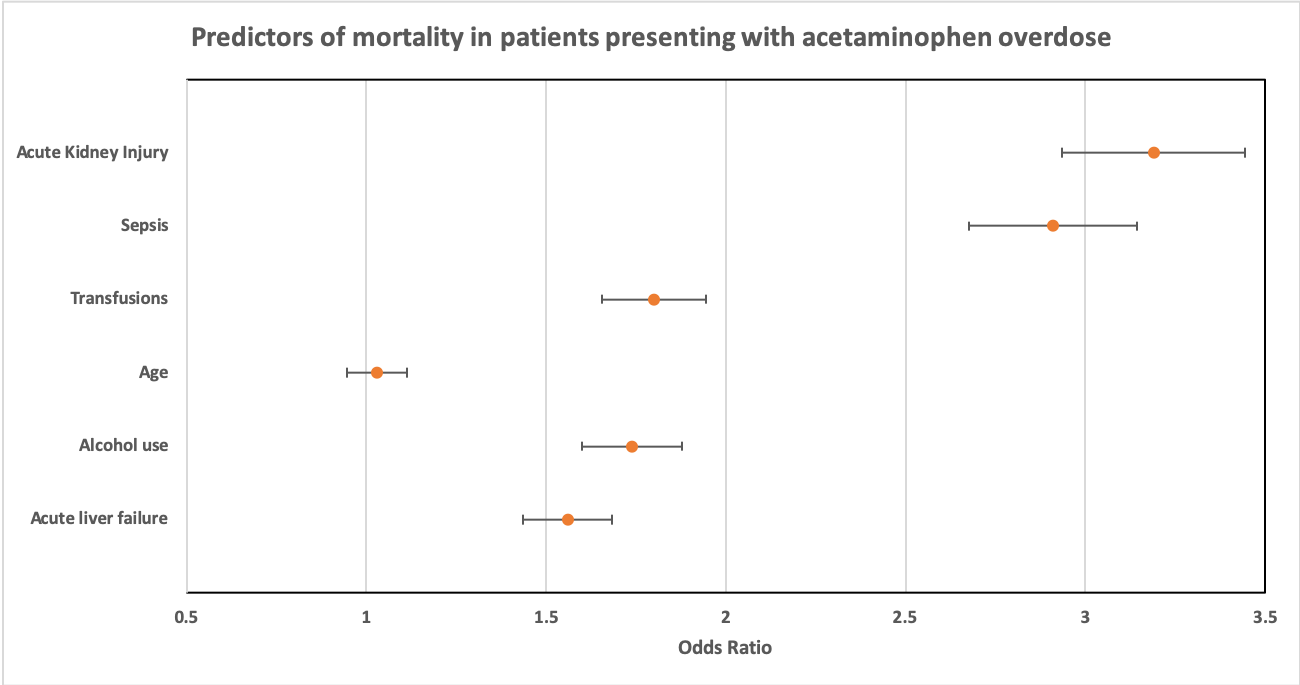Characteristics and Outcomes of Acetaminophen Overdose Related Hospitalizations Requiring Liver Transplant
1West Virginia University-Charleston division, Charleston, WV, 2University of Tennessee Health Science Center, Memphis, TN, 3Beth Israel Deaconess Medical Center, Boston, MA, 4Rochester General Hospital, Rochester, NY, 5Charleston Area Medical Center, Charleston, WV
Meeting: 2020 American Transplant Congress
Abstract number: B-124
Session Information
Session Name: Poster Session B: Liver: MELD, Allocation and Donor Issues (DCD/ECD)
Session Type: Poster Session
Date: Saturday, May 30, 2020
Session Time: 3:15pm-4:00pm
 Presentation Time: 3:30pm-4:00pm
Presentation Time: 3:30pm-4:00pm
Location: Virtual
*Purpose: Acetaminophen overdose (AO) may lead to severe liver damage requiring an urgent liver transplant (LT). The data on hospital-related outcomes in patients with AO who receive LT remains mostly unexplored. We sought to assess the characteristics and outcomes of AO related hospitalizations which require LT through large database analysis.
*Methods: We queried the National Inpatient Sample (NIS) from 2005 till 2014 to identify the AO related hospitalizations with and without LT, using the ICD-9 CM codes. Outcomes included LT procedural rate, in-patient mortality, length of stay (LOS), and inflation-adjusted hospitalization costs associated with AO hospitalization. Statistical analysis was performed using the STATA software using the Chi-Square, Fisher Exact, and multiple logistic regression analysis.
*Results: A total of 334,571 AO related hospitalizations were identified, out of which 287 (0.8%) underwent liver transplant. Patients who received LT were younger (mean age 34.12 vs. 37.93 years) with a predominance of females 86.37% (p-value: <0.001). Overall in-patient mortality was recorded 5,398 (1.61%) with 23 (8.01%) in-hospital deaths for patients in the LT group. Patients who received LT had decreased odds of in-patient mortality (adj OR: 0.24, p= 0.027, 95% CI: 0.069-0.85) as compared to non-LT group. Mean LOS (21.69 vs. 3.33 days) and total hospitalization cost ($174,354 vs. $7,827) were higher in patients who received LT. We found acute kidney injury (adj OR: 3.19, p-value <0.001, 95% CI: 2.64-3.87), sepsis (adj OR: 2.91, p-value <0.001, 95% CI: 2.22-3.80), pre-existing alcohol liver disease (adj OR: 1.74, p-value: 0.009, 95% CI: 1.15-2.64) and severe acute liver failure (adj OR: 3.19, p-value :0.008, 95% CI: 1.12-2.18) independent predictors of poor outcomes.
*Conclusions: Our study demonstrates that less than 1% of patients who presented with AO underwent LT. Although LT was associated with improved mortality, many patients died from AO without undergoing LT. This may be explained by a lack of access and/or timely transfer to a transplant center. Future studies are required to identify areas of improvement from initial healthcare contact to organ allocation for such high-risk patients. Moreover, factors such as acute kidney injury and sepsis, which are associated with poor outcomes in AO, should be effectively managed in the pre-transplant setting.
To cite this abstract in AMA style:
Khan A, Saleem N, Bilal M, Tariq R, Singh S. Characteristics and Outcomes of Acetaminophen Overdose Related Hospitalizations Requiring Liver Transplant [abstract]. Am J Transplant. 2020; 20 (suppl 3). https://atcmeetingabstracts.com/abstract/characteristics-and-outcomes-of-acetaminophen-overdose-related-hospitalizations-requiring-liver-transplant/. Accessed February 26, 2026.« Back to 2020 American Transplant Congress

